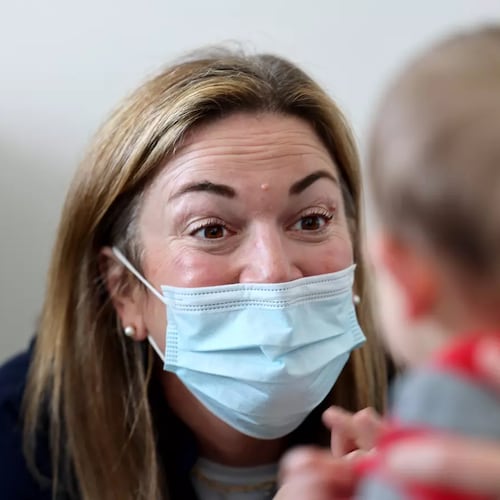With a new school year beginning, vaccination rates for routine childhood shots have still not returned to pre-pandemic levels, according to the Centers for Disease Control and Prevention.
Vaccination rates in Georgia have also hovered below the national average and well below a critical threshold for keeping once-common, serious illnesses at bay, according to the most recent data available.
In Georgia for the 2023-2024 school year, 88% of kindergarteners received routine vaccinations, which include the measles, mumps and rubella (MMR) vaccine; the diphtheria, tetanus and acellular pertussis (DTaP) vaccine; the poliovirus (polio) vaccine; and the varicella (chickenpox) vaccine. For the U.S. overall, 93% of children in kindergarten met the vaccination requirements. The coverage rate for incoming kindergarteners likely won’t be available for several months.
Before the pandemic, the rate in Georgia was 93% and then it plummeted to 83% during the 2022 school year.
The percentage of kindergarteners whose parents opted them out of state-required childhood vaccinations (exemptions for religious and health reasons) was also climbing for several years, but fell by about 1 percentage point recently to 3.8% during the 2023 school year.
“Georgia rates have really come up in the past few years and we are on the right trajectory, but certainly there is still some room to go,” said CDC Chief Medical Officer Dr. Debra Houry in an interview.
The goal, Houry said, is 95%, the point at which enough people are immune to a disease to make it hard for the infection to spread. While the percentage of people who need to be immune in order to achieve herd immunity varies with each disease, herd immunity against measles requires about 95% of a population to be vaccinated.
“The more we have all kids vaccinated, and somebody comes in with an illness, they’re less likely to spread it, and kids are less likely to get hospitalized with a serious illness,” she said.
Dr. Angela Highbaugh-Battle, who practices in St. Marys and is former president of the Georgia chapter of the American Academy of Pediatrics, said vaccine hesitancy persists but she is seeing it a “little less.”
“My message: childhood vaccinations are an amazing opportunity to prevent serious diseases,” she said.
Houry believes a combination of factors have led to vaccine hesitancy, with the pandemic exacerbating misinformation and questions about COVID vaccines lowering confidence in vaccines in general.
“But I also think it’s because we haven’t seen a lot of cases of things like measles and polio,” she said. “We’re a victim of own success because we’ve prevented so many of these diseases, people don’t think they’re necessary and so they are starting to not to do these vaccines.”
There have been four cases of measles in Georgia this year including an international student visiting Georgia, and a family where one of the family members had traveled internationally. All of them were unvaccinated. One of the people sickened with measles was hospitalized.
Measles is so contagious that if one person has it, up to 90% of the people close to that person who are not immune will also become infected, according to the CDC. Measles spreads through the air when an infected person coughs or sneezes. The virus can stay in the air or on surfaces for up to two hours after an infected person has left the room.
Measles symptoms appear 7 to 14 days after contact with the virus and typically include high fever, cough, runny nose, and watery eyes. The best known symptom is a rash of tiny red spots that typically start at the head and spread to the rest of the body.
Measles can cause serious health complications, including pneumonia and encephalitis (inflammation of the brain) especially in children younger than 5 years of age, according to the CDC.
But the MMR (measles, mumps, rubella) vaccine, which is traditionally given to children, is very effective and can prevent illness. The CDC recommends children receive their first dose of MMR vaccine between 12 to 15 months of age and a second dose at 4 to 6 years old.
With wide use of the vaccine, measles was declared eliminated in the U.S. in 2000. But in 2019, the U.S. saw nearly 1,300 measles cases across 31 states, making the highest number since 1992 and a record since measles was considered eliminated in the country. The 2019 outbreak in the U.S. included an outbreak of 11 cases in Cobb County, which was contained.
Some parents, worried about getting five more shots on a single day could overwhelm a baby, seek to spread out vaccines. Many vaccines are combined so that only one injection is needed. The CDC says giving a child multiple vaccines at the same time has been shown to be safe and can help make sure children are protected as soon as possible and it can mean fewer office visits.
Mental Health Considerations
As children return for another school year, Houry said it’s also important to give consideration to mental health.
Houry said it’s important that kids have social connections with other kids through extracurricular activities, such as a club or team sport. She said it’s important to encourage children to express their feelings and reassure them. “You might get that ‘yes’ or ‘no’ answer but dive a little bit to ask and understand and destigmatize and make it okay. You can tell them, ‘It’s okay to feel X, Y or Z.’”
Daily routines, such as early bedtime or putting away electronics an hour before bed is important, she said.
Make sure teens are aware of the 988 hotline, a three-digit number for people experiencing a mental health or substance abuse crisis.
“As a parent, anything you find concerning like, wanting to hurt themselves, if you noticed changes in relationships, school issues, those are red flags,” and should be discussed and evaluated by a pediatrician or family practitioner.
“I think that as we go back to school, for parents, to really think about the physical and mental health of our kids,” she said. “It’s a great time to do a pulse check.”
Required vaccines for kindergarteners in Georgia:
The diphtheria, tetanus, and pertussis (DTaP) vaccine: a vaccination that prevents these three infections including pertussis, commonly known as whooping cough.
The hepatitis B vaccine (HepB) vaccine: protects against hepatitis B, a liver infection caused by the hepatitis B virus.
Polio (IVP) vaccine: this inactivated polio vaccine: protects against polio, which can cause paralysis and death.
The measles, mumps and rubella vaccine (MMR): protects against these three viral infections.
The chickenpox (varicella) vaccine: protects against this contagious viral infection that causes fever, headache, and an itchy, blistering rash; spread through air and direct contact.
The hepatitis A (HepA) vaccine: protects against hepatitis A, a contagious viral infection of the liver; spread by contaminated food or drink or close contact with an infected person.
Notes: These vaccines require multiple doses. Additional vaccine requirements for 7th graders include meningococcal conjugate (MenACWY) and a booster for this vaccine at age 16. This vaccine helps prevent meningococcal disease, which is a very serious infection and can be deadly within hours.
The CDC also recommends a seasonal flu vaccine and a COVID vaccine for children but these are not required for school attendance.
About the Author
Keep Reading
The Latest
Featured



